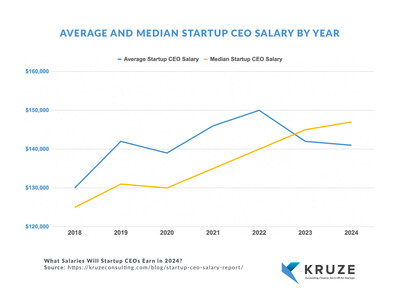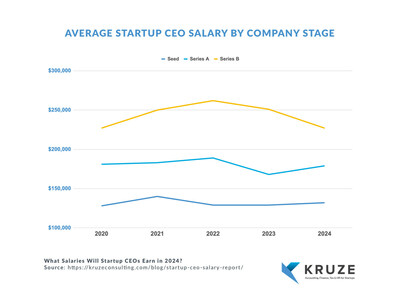USA
Average startup CEO salary declines – Pay Gap Widens in 2024 according to Kruze Consulting report.
The startup accounting and CFO consulting firm servicing more than 800 venture funded startup clients, released new data on CEO salaries today.
The report, based on anonymized payroll data, is the longest running and largest startup CEO salary report in the world. While the salaries of startup CEOs declined on average, early-stage CEOs saw modest pay increases and Series B CEOs endured a 10% pay cut.
The pay gap between female and male CEOs remains persistent at $14,000, but expanded on a percentage basis due to the decline in average salaries.


“
This year’s CEO salary data reflects resilience in early-stage startups and turbulence in the later-stage market. Seed and Series A startups saw solid pay moves whereas Series B CEOs’ salaries came down on average.
Healy Jones, VP at Kruze Consulting, noted that although funding rounds decreased, startups raised strong Seed and Series A rounds. The persistent gender pay gap, failing to rebound to pre-pandemic levels, remains a concern since the initial pandemic-induced disparity
In 2019, the gender pay gap stood at $5,000, ballooning to $45,000 during the pandemic. Since 2020, it slightly improved, stabilizing at $14,000, roughly 10%, since then.
Professional startup investors usually have a say in executive pay, presenting VCs with a chance to influence change in this area.
Since 2018, we’ve conducted this study annually to provide Founders and investors with data for informed executive compensation decisions.
In 2023, the average startup CEO salary was $142,000, dipping slightly to $141,000 in 2024. CEOs of Series B startups experienced a nearly 10% decrease, from $251,000 in the previous year to $227,000 in 2024.
Salaries for Series A CEOs rose by 6.5%, climbing from $168,000 in 2023 to $179,000 in 2024. Meanwhile, average pay for Seed stage CEOs increased by 2.3%, from $129,000 in 2023 to $132,000 in 2024.
Only the best startups were able to raise Seed and Series A rounds recently, driving the increase in CEO pay. The past 2 years have been very difficult for Series B and beyond companies to fundraise, so those executives are responding by keeping executive compensation lower to preserve capital.





